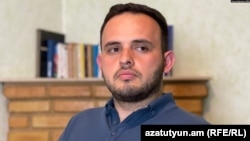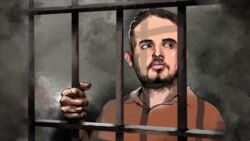As a journalist for Radio Free Europe/Radio Liberty, Farid Mehralizada became known for his analytical work that systematically debunked state propaganda in Azerbaijan. For the last year, it's all he's heard.
Mehralizada, a trained economist, was arrested on May 30, 2024, when security agents jumped him, put a hood over his head, and whispered in his ear, "You talk too much."
He was subsequently brought up on smuggling charges that he says are politically motivated and tied directly to his critical reporting for RFE/RL's Azerbaijani Service, known locally as Azadliq Radiosu.
In detention, the 30-year-old says he has no access to media outlets other than those under state control.
"For 365 days, I have not witnessed justice being served. I have witnessed its deliberate destruction," he said as he marked a year in detention that kept him from being with his wife when she gave birth to their child.
Since taking power shortly before the death of his predecessor and father, Heydar Aliyev, in 2003, President Ilham Aliyev has faced accusations of suppressing dissent by detaining journalists, opposition figures, and civil society activists.
That trend appears to have accelerated recently, with more than 30 journalists and human rights defenders arrested on similar charges that international institutions regard as politically motivated.
Yet Azerbaijani authorities consistently deny these characterizations. In the case of Mehralizada and others recently detained, the government insists their arrests stem from specific criminal acts, not political reprisal.
"Azerbaijani authorities have stolen one year of Farid Mehralizada's life -- a year that should have been filled with joy and excitement for his growing family," said Steve Capus, president and chief executive officer of RFE/RL.
"Instead, Farid has spent it behind bars for the 'crime' of journalism, missing the birth of his first child. He has done nothing wrong and must be released immediately."
During his trial, Mehralizada carefully laid out the circumstances of his arrest as evidence that the case was politically motivated as a response to his "critical opinions regarding the social and economic policies implemented in Azerbaijan."
Mehralizada has highlighted that his economic analyses frequently criticized Azerbaijan's reliance on oil and gas and questioned official unemployment and poverty statistics.
"One of the policemen told me, 'You're a young man. Do you really need Azadliq Radiosu? Just keep your head down and live your life,'" he testified at an earlier court session. "This shows that my arrest was indeed connected to my articles forAzadliq Radiosu."
Additional charges, including illegal entrepreneurship, tax evasion, gang smuggling, and document forgery, have since been added to his case -- accusations he and his supporters call fabricated and further evidence the case is being driven by political forces.
Meanwhile, prosecutors have asked the court to sentence Mehralizada and two other journalists -- Ulvi Hasanli, the director of the AbzasMedia independent news agency, and journalist Hafiz Babali -- being tried in the case to 12 years in prison.
"The one-year anniversary of Farid Mehralizada's imprisonment is another sorry milestone in Azerbaijan's vast crackdown on independent media," said Attila Mong, the European representative for the Committee to Protect Journalists (CPJ).
"Farid has committed no crime besides his reporting for RFE/RL and the critical interviews he gave to independent media as an expert economist," added Mong. "It is time for Azerbaijani authorities to allow Farid to go home to his family and his firstborn daughter whose birth he missed due to his jailing. US authorities, in particular, should do their utmost to ensure his release as an RFE/RL journalist."
Despite limited access to information, Mehralizada has continued to deconstruct the narratives promoted by government-controlled media.
In a letter sent from prison, Mehralizada argues that public understanding and participation in economic processes are the only way to creating a sustainable economy.
"I have always believed that the Azerbaijani people…deserve to live today in a more just and prosperous society. Our nation possesses sufficient resources to make that a reality. That this has not happened is due to failures in governance," he wrote.












